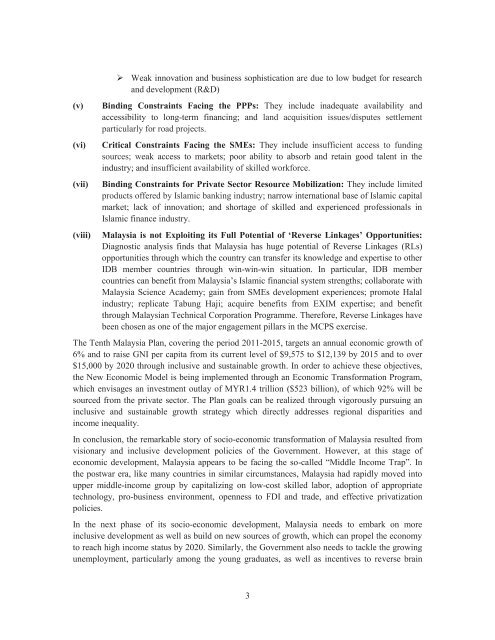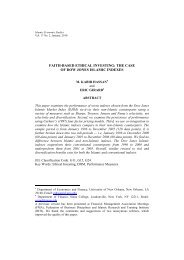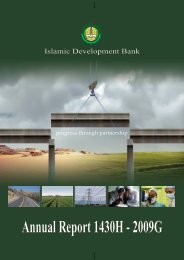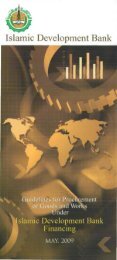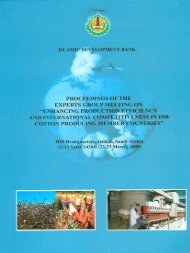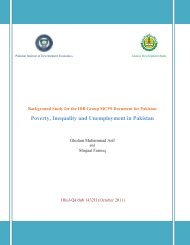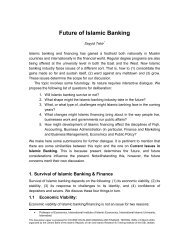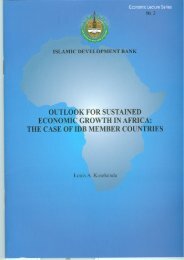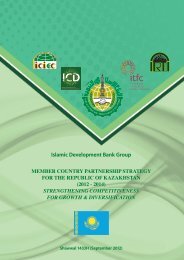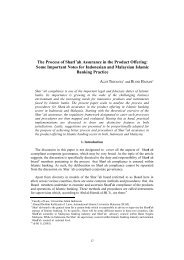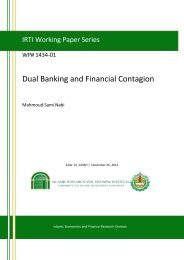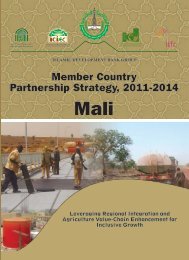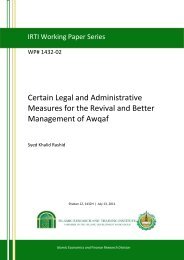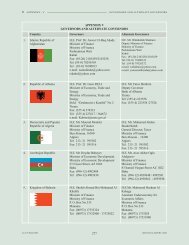Country Economic Work for Malaysia - Islamic Development Bank
Country Economic Work for Malaysia - Islamic Development Bank
Country Economic Work for Malaysia - Islamic Development Bank
You also want an ePaper? Increase the reach of your titles
YUMPU automatically turns print PDFs into web optimized ePapers that Google loves.
(v)<br />
(vi)<br />
(vii)<br />
(viii)<br />
‣ Weak innovation and business sophistication are due to low budget <strong>for</strong> research<br />
and development (R&D)<br />
Binding Constraints Facing the PPPs: They include inadequate availability and<br />
accessibility to long-term financing; and land acquisition issues/disputes settlement<br />
particularly <strong>for</strong> road projects.<br />
Critical Constraints Facing the SMEs: They include insufficient access to funding<br />
sources; weak access to markets; poor ability to absorb and retain good talent in the<br />
industry; and insufficient availability of skilled work<strong>for</strong>ce.<br />
Binding Constraints <strong>for</strong> Private Sector Resource Mobilization: They include limited<br />
products offered by <strong>Islamic</strong> banking industry; narrow international base of <strong>Islamic</strong> capital<br />
market; lack of innovation; and shortage of skilled and experienced professionals in<br />
<strong>Islamic</strong> finance industry.<br />
<strong>Malaysia</strong> is not Exploiting its Full Potential of ‘Reverse Linkages’ Opportunities:<br />
Diagnostic analysis finds that <strong>Malaysia</strong> has huge potential of Reverse Linkages (RLs)<br />
opportunities through which the country can transfer its knowledge and expertise to other<br />
IDB member countries through win-win-win situation. In particular, IDB member<br />
countries can benefit from <strong>Malaysia</strong>’s <strong>Islamic</strong> financial system strengths; collaborate with<br />
<strong>Malaysia</strong> Science Academy; gain from SMEs development experiences; promote Halal<br />
industry; replicate Tabung Haji; acquire benefits from EXIM expertise; and benefit<br />
through <strong>Malaysia</strong>n Technical Corporation Programme. There<strong>for</strong>e, Reverse Linkages have<br />
been chosen as one of the major engagement pillars in the MCPS exercise.<br />
The Tenth <strong>Malaysia</strong> Plan, covering the period 2011-2015, targets an annual economic growth of<br />
6% and to raise GNI per capita from its current level of $9,575 to $12,139 by 2015 and to over<br />
$15,000 by 2020 through inclusive and sustainable growth. In order to achieve these objectives,<br />
the New <strong>Economic</strong> Model is being implemented through an <strong>Economic</strong> Trans<strong>for</strong>mation Program,<br />
which envisages an investment outlay of MYR1.4 trillion ($523 billion), of which 92% will be<br />
sourced from the private sector. The Plan goals can be realized through vigorously pursuing an<br />
inclusive and sustainable growth strategy which directly addresses regional disparities and<br />
income inequality.<br />
In conclusion, the remarkable story of socio-economic trans<strong>for</strong>mation of <strong>Malaysia</strong> resulted from<br />
visionary and inclusive development policies of the Government. However, at this stage of<br />
economic development, <strong>Malaysia</strong> appears to be facing the so-called “Middle Income Trap”. In<br />
the postwar era, like many countries in similar circumstances, <strong>Malaysia</strong> had rapidly moved into<br />
upper middle-income group by capitalizing on low-cost skilled labor, adoption of appropriate<br />
technology, pro-business environment, openness to FDI and trade, and effective privatization<br />
policies.<br />
In the next phase of its socio-economic development, <strong>Malaysia</strong> needs to embark on more<br />
inclusive development as well as build on new sources of growth, which can propel the economy<br />
to reach high income status by 2020. Similarly, the Government also needs to tackle the growing<br />
unemployment, particularly among the young graduates, as well as incentives to reverse brain<br />
3


